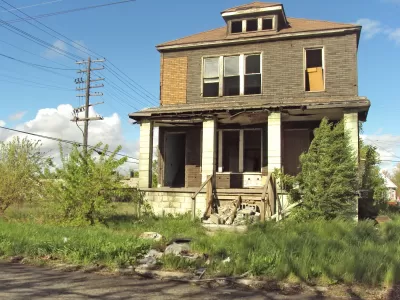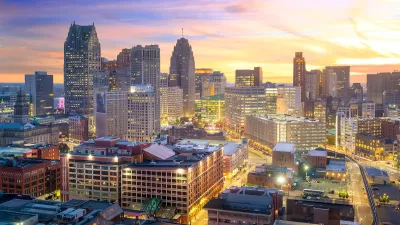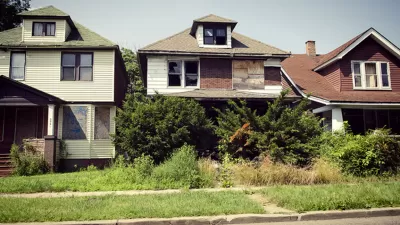While the Detroit Land Bank has had its ups and downs, it has made significant progress in a city with no shortage of vacant and delinquent properties.

John Gallagher takes a closer look at the Detroit Land Bank Authority, both its accomplishments and difficulties in recent years. The Land Bank was established in 2008, but it was not until 2014 that it gained traction and acquired the city’s 50,000 vacant parcels, says Gallagher:
Since then, property tax foreclosure and other trends have boosted the Detroit Land Bank's inventory to about 95,000 parcels today — more than one-fourth of all the individual parcels in the city. It is the largest such inventory of publicly held land of any city in the nation.
The Land Bank makes vacant lots, houses, and other buildings available through sales, auctions, and a buyback program for homes facing property tax foreclosure. “Beginning in 2014, when Detroit Land Bank organized on its current model, it has auctioned 1,866 houses, sold 1,906 properties through the Own It Now program and closed on about 500 BuyBack sales, in addition to then 10,000 side-lot sales,” reports Gallagher.
The Land Bank, however, has been criticized for not selling properties fast enough. The organization had also grappled with leadership turnover in its first years, until its current executive director took the helm a year ago. In addition, the demolition program to remove blighted structures, affiliated with the Land Bank, is facing allegations of corruption, says Gallagher.
Still, Gallagher believes the Land Bank has achieved a great deal in a relatively short amount of time. “In the broadest sense, the Land Bank’s achievements give hope that urban problems really can be solved. If a challenge as intractable as Detroit’s vacant and abandoned land can yield to innovation and commitment, perhaps all the city’s ills will so yield,” he says.
FULL STORY: Detroit Land Bank notches many wins including 10,000 side-lot sales

Planetizen Federal Action Tracker
A weekly monitor of how Trump’s orders and actions are impacting planners and planning in America.

Congressman Proposes Bill to Rename DC Metro “Trump Train”
The Make Autorail Great Again Act would withhold federal funding to the system until the Washington Metropolitan Area Transit Authority (WMATA), rebrands as the Washington Metropolitan Authority for Greater Access (WMAGA).

The Simple Legislative Tool Transforming Vacant Downtowns
In California, Michigan and Georgia, an easy win is bringing dollars — and delight — back to city centers.

The States Losing Rural Delivery Rooms at an Alarming Pace
In some states, as few as 9% of rural hospitals still deliver babies. As a result, rising pre-term births, no adequate pre-term care and "harrowing" close calls are a growing reality.

The Small South Asian Republic Going all in on EVs
Thanks to one simple policy change less than five years ago, 65% of new cars in this Himalayan country are now electric.

DC Backpedals on Bike Lane Protection, Swaps Barriers for Paint
Citing aesthetic concerns, the city is removing the concrete barriers and flexposts that once separated Arizona Avenue cyclists from motor vehicles.
Urban Design for Planners 1: Software Tools
This six-course series explores essential urban design concepts using open source software and equips planners with the tools they need to participate fully in the urban design process.
Planning for Universal Design
Learn the tools for implementing Universal Design in planning regulations.
Smith Gee Studio
City of Charlotte
City of Camden Redevelopment Agency
City of Astoria
Transportation Research & Education Center (TREC) at Portland State University
US High Speed Rail Association
City of Camden Redevelopment Agency
Municipality of Princeton (NJ)




























